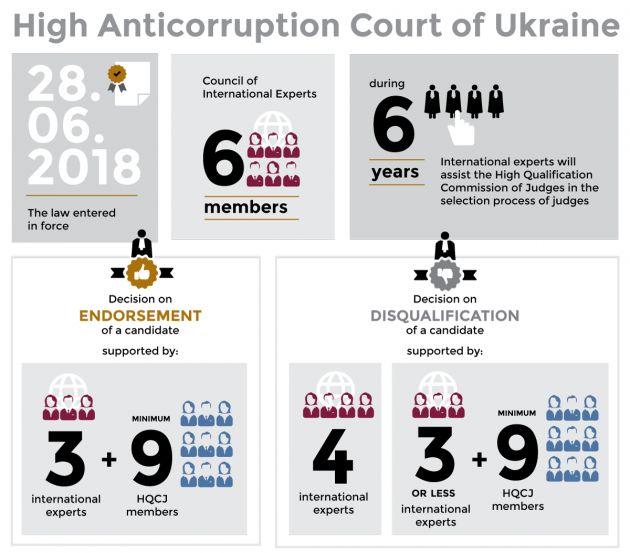After two years of debate and a lot of pressure from civil society and international organizations, in June Ukraine’s Parliament finally passed the Law on the High Anti-Corruption Court of Ukraine (HACCU or Anti-Corruption Court). Now, the HACCU has to be created. It will consist of thirty-nine judges to be appointed with involvement of six international experts nominated by international organizations and the European Union. They will verify the professional integrity of candidates and have a decisive say on whether candidates can go forward or not.
Arguments have been made that the role of foreign experts violates the sovereignty as outlined in Ukraine’s Constitution, but using special procedure for the creation of courts does not undermine Ukraine’s sovereignty. It also aims at increasing public trust in a new institution, avoiding problems that overshadowed the selection of judges for the Supreme Court when a significant number of applicants were appointed against the objections of the advisory Public Council of Integrity. The selection process has started and from 8 August until 14 September candidates for the new Anti-Corruption Court can submit their applications.
The decisive right of international experts is therefore positive, but the process has potential pitfalls. International organizations und Ukraine’s civil society should closely monitor the selection process and support each other to prevent any manipulations. The major concern is the short timeframe of 30 days, within which the international experts must decide whether to endorse a candidate or not. If they do not manage to do so, a candidate is deemed to have passed the professional integrity test automatically.
Why engaging international experts?
On 28 June 2018 the Law on the High Anti-Corruption Court of Ukraine entered into force. The Court was the only institution still missing from Ukraine’s recently established anti-corruption system, which includes a prevention unit (National agency on corruption prevention), investigative unit (National Anti-Corruption Bureau, NABU), special prosecutor’s office (Specialized Anti-corruption Prosecution) and judicial component (HACCU). Civil society and the international community widely acknowledged that without a special anti-corruption jurisdiction, the efforts of these institutions might have come to nothing. So far, the lower unreformed courts of general jurisdiction have failed in solving anti-corruption cases brought by the NABU: as of 31 January 2018, out of 121 indictments, there have been only 21 convictions with no senior official going to jail.
At the same time, it is also clear that corrupt officials can only be brought to justice if the new Anti-Corruption Court is free from political influence. The first step to ensure impartiality of the Court is to appoint credible and professional judges. Considering the flawed selection procedure of judges for a new Supreme Court, when a significant number of candidates were appointed by the High Qualification Commission of Judges (HQCJ) despite not passing the vetting by the Public Council of Integrity (PCI) against integrity criteria, Ukraine’s reformists and civil society, as well as the international community, insisted that international experts monitor the selection process for the Anti-Corruption Court.
Decisive rights of foreign experts?
The controversy over involvement of international experts was a major roadblock to the law’s adoption for several months. Whereas civil society and the international community insisted on the right to veto for international experts, certain Ukrainian officials, citing the need to safeguard Ukraine’s sovereignty and to stick to the letter of its Constitution, advocated for a mere advisory function.
A compromise was reached based on the President’s bill No. 7440: It foresees a Council of International Experts (CIE) composed of six experts having a right to block a candidate who does not meet the criteria of professional integrity by a majority vote of at least 4 out of 6 members. Such a decision of the CIE cannot be overruled by the HQCJ. The candidate can be also disqualified when at least three international experts and nine members of the HQCJ vote for such a disqualification. At the same time, the candidate can be endorsed as judge only when he or she is supported by at least 3 international experts and 9 members of the HQCJ in the common session of the CIE and HQCJ.
(click on an image for a closer view)
The compromise on the rights of foreign experts differs from what was initially suggested in bill No. 7440 from the President. The adopted version of the Law includes a reduced number of international experts in general (from 7 to 6 members). As a result, it also requires a smaller majority for a candidate to be endorsed by foreign experts: from 4 to 3 votes in favour. However, despite losing one member, the CIE made a more significant gain: Any HQCJ decisions on the admissibility of judges must be supported by at least three members of the CIE and four votes from international experts can disqualify a candidate. This means that the international experts hold the power of blocking any candidate as long as four of them agree.
Rights of international experts and Ukraine’s sovereignty
The law on the Anti-Corruption Court was a difficult birth for Ukraine’s Parliament. One roadblock was the rights to be granted to international experts. Among six legislative initiatives registered with the Verkhovna Rada to launch the anti-corruption court, one included a mere advisory role for international experts whose recommendations could be overruled by the HQCJ, while three draft laws dispensed with any involvement of foreign experts. Advocates for limiting or not involving international stakeholders voiced concerns over the loss of sovereignty and the integrity of Ukraine’s constitutional order. Their arguments typically referred to the following provisions of the Constitution: Article 5, which recognizes the Ukrainian people as the only source of power, and Article 125, prohibiting the creation of special or extraordinary courts.
Whereas the evocation of Article 125 brings into question the very existence of an anti-corruption court, the use of Article 5 challenges the veto right of international experts in the selection of judges. The literal reading of Article 5 leads to the conclusion that only Ukraine’s citizens can decide on the organization of its institutions, including judicial ones. However, as long as full power resides with the people of Ukraine, and they – directly or indirectly through the MPs – delegate tasks related to establishing state institutions to international experts, or share tasks and competences with international organizations, Article 5 remains intact.
This logic is also behind recent initiatives in Ukraine to invite international experts to facilitate and support the creation of anti-corruption or law-enforcement institutions. For example, with the agreement of Ukraine’s authorities, the engagement of foreign experts has been practiced in the selection of the NABU Director and of the Head of the Special Anti-Corruption Prosecutor’s Office. Furthermore, a modern understanding of sovereignty is oriented toward human rights rather than state rights, meaning that the state implements its sovereignty by safeguarding the human rights of its citizens. Since the aim of incorporating international experts is to strengthen Ukraine’s judiciary in order for it to better protect human rights, this measure may be seen as actually enhancing state sovereignty.
Thus, despite being controversial and unusual, the involvement of international experts in the selection procedure per se neither infringes on Ukraine’s sovereignty nor contradicts its Constitution. This was also pointed out by the Venice Commission that assessed bill No. 7440 in its original version as proposed by the President. While the Commission agreed that the involvement of international experts is an exceptional measure, it still considered it plausible and underscored that, according to the ECHR jurisprudence, creating courts using a special procedure does not undermine their independence. Placing Ukraine’s situation in the international context, the Venice Commission also stressed that “it is not unusual that anti-corruption institutions are established with considerable support and input from international donors, and it is not unheard of that foreign nationals play some part in the judiciary; for example, in certain very small countries, even judges may be foreign nationals. The international involvement seems to be justified in the specific situation in Ukraine, with due regard to the principle of Ukraine’s sovereignty.”
The Venice Commission sees the involvement of international experts as key to achieving public trust in the newly established court. This assumption is well justified given the higher rate of trust in institutions created with international assistance over the last few years compared to traditional Ukrainian agencies. According to polls, the NABU, created with support of foreign actors, is trusted more than any other law-enforcement agency in Ukraine. National surveys also show that Ukrainian society believes international experts should play a key role in lustration and in control of the judiciary.
Challenges, pitfalls and recommendations
The compromise is a victory for reformists and the role of international experts is different from the role of civil society experts in the selection of the Supreme Court’s Judges. It should encourage qualified candidates to apply for the positions of judges.
Yet the Law provisions on the role of international experts are not perfect:
- The HQCJ approves the members of the CIE nominated by international organizations (two candidates from an international organizations). Considering the critique faced by the HQCJ during the selection procedure of the Supreme Court judges, some Ukrainian experts and activists are concerned that the HQCJ may approve foreign experts who are more loyal towards Ukraine’s government. The Law does not stipulate which and how international organizations will nominate their candidates. For example, the literal reading of the law may exclude the European Union, a key financial supporter of the anti-corruption reforms in Ukraine, as it is a sui generis entity and not an international organization. However, according to the information from the HQCJ, the European Union has been added to the list of international organizations with nomination capacity.
- The CIE is not involved in the knowledge tests and interviews with the candidates. It only steps in to assess professional integrity after the candidates passed pre-selection exam and is not involved in the evaluation of the qualification exam. Some Ukrainian activists and experts suggested that international experts should participate in the competition as a whole. They argue, that within its current role, the CIE can only veto the worst candidates, which does not address possibility of questionable and arbitrary decisions of the HQCJ, a problem many saw in HQCJ’s practices when selecting Supreme Court judges.
- The major concern though is the timeframe: the law gives the CIE 30 days to vet the candidates. If within the 30 days the CIE fails to initiate a joint panel with the HQCJ regarding problematic candidates, they will automatically pass the test on integrity. For now it is not clear how many applicants will compete for the judge positions in HACCU. However, the numbers may be quite high since approximately 530 non-binding declarations of intention to participate in the competition have already been submitted to the HQCJ. On the other hand, the CIE will evaluate the profiles of only those who will pass several pre-selection rounds. Considering the workload of the CIE and the time needed to translate the candidate’s information, the Council will face a tough timeframe.
Given these challenges and pitfalls, the international community and civil society, particularly those NGOs working in the anti-corruption sector, should monitor the process closely and support each other to ensure any manipulations and sabotage are avoided.




